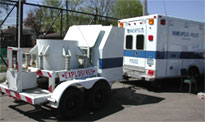 Every day we are reminded of the risks that law enforcement officers face. Media reports focus on officer shootings leading to the misperception that gunfire is the greatest risk to which an officer is exposed. No one can deny the inherent risk of an officer being shot but the startling fact is that more officers die from suicide than any other cause. I have lost two clients this year due to suicide. Two other officers died from suicide in November.
Every day we are reminded of the risks that law enforcement officers face. Media reports focus on officer shootings leading to the misperception that gunfire is the greatest risk to which an officer is exposed. No one can deny the inherent risk of an officer being shot but the startling fact is that more officers die from suicide than any other cause. I have lost two clients this year due to suicide. Two other officers died from suicide in November.
Post-traumatic stress disorder, or PTSD, is a mental health condition that may affect people who have experienced or witnessed a traumatic event such as a serious accident, significant bodily injury, sexual abuse/violence or other personal assault.
It has been estimated that 15 percent of police officers in the U.S. experience symptoms consistent with PTSD. Based upon my experience with law enforcement, the percentage of police officers experiencing symptoms consistent with PTSD is substantially higher. In Minnesota, there are approximately 10,400 licensed officers. Even assuming the 15% is accurate, that means over 1,500 Minnesota law enforcement officers are dealing with the debilitating effects of PTSD on an ongoing basis.
While a law enforcement officer can develop PTSD as a result of a single incident, our experience with law enforcement is that the vast majority of officers develop symptoms as a direct result of their cumulative exposure to hundreds of traumatic incidents such as suicides, motor vehicle and industrial accidents, homicides, sexual assault and the death of children over the course of their career.
No one chooses to have PTSD. And, I assure you, it is almost impossible to “fake” PTSD. Symptoms can develop shortly after a critical incident, or they can develop gradually, over an extended period, often going undiagnosed for years.
Every case is different but common symptoms include anxiety, panic, depression, nightmares, intrusive thoughts, sleeplessness, fatigue, feelings of detachment or estrangement from others, hypervigilance, irritability, anger, flashbacks, lack of concentration or focus, reckless or self-destructive behavior and suicidal thoughts.
Perhaps it is how law enforcement officers are wired, perhaps it is the culture in which they work but the reality is that the vast majority of our officers never seek help on their own, choosing to deal with their symptoms on their own, suffering in silence.
These symptoms don’t just affect the officers but also have a profound effect on the officers’ family and friends. Relationships are damaged if not destroyed. It is common for the spouse or significant other of an officer to make the initial contact with our office noting that their loved one is “not the same person” they once were.
Too often our clients convince themselves that if only they can make it until they turn 55 years old then they can retire and their life will return to normal. Unfortunately, this is a recipe for disaster. Through continued exposure to traumatic events, their condition will worsen over time. PTSD is not a condition to ignore. It is the real deal. I never want to look into the eyes of a loved one having lost someone because they did not receive necessary treatment in time.
Many departments offer EAP, Employee Assistance Programs. These programs are of limited help as they are often provided immediately after a traumatic event before an officer begins experiencing symptoms. Moreover, officers are hesitant to work with EAP for fear that their superiors will learn that they are seeking assistance and place their career in jeopardy. No one wants to be “that guy” that everyone talks about as being too emotional or weak.
PTSD is a silent epidemic. You cannot tell by looking at someone, if he or she is suffering from PTSD. An officer suffering from PTSD may be able to put on a brave face for short periods of time but fall apart as soon as they are in private. PTSD does not strike all at once. It comes on gradually without your knowledge or understanding. Over time it may overwhelm you to the point that you can no longer function. PTSD must be addressed head-on. An officer with PTSD does not have to suffer in silence. There are resources available to officers who have PTSD to prevent the loss of their lives, careers or family.
What can an officer or a loved one do if they think that they are suffering from symptoms consistent with PTSD?
- Seek counseling. You cannot address this issue on your own. Personally, I recommend that you seek a counselor who specializes in working with law enforcement officers suffering with PTSD. Law enforcement is unique and different from the general public. I would not necessarily recommend going through EAP as the officer must be able to trust the counselor and preserve their ability to continue in their careers. Treatment can be sought “off the books” through a confidential source.
- Talk to a lawyer who concentrates in this area of law. You need a lawyer knowledgeable about workers compensation, PERA, and the Continuation of Healthcare under Minnesota Statute 299A.465. Each of these types of claims are potentially available to officers and are designed to ensure that medical expenses and wage loss are covered while the officer is treating and may be available in the event an officer is unable to return to law enforcement.
What can the department do to help officers suffering from PTSD?
- Law enforcement agencies must focus on the long term. They must address the problem, not deny it. They must change the culture to ensure that an officer struggling with PTSD is supported not ridiculed. Treat mental conditions in the same manner as they do physical conditions. This will not happen overnight but with time can and must be implemented. Too many experienced officers are leaving their departments at a time in which the departments can least afford to lose them.
- Provide officers with counseling on a semi-annual basis with a psychologist of their own choosing on a confidential basis where records are protected and knowledge of an officers seeking treatment is limited to non-superiors with protections ensured against adverse consequences to their jobs.
We must all work together to stem the tide of PTSD. Officers risk their lives every day to protect us. The least that we can do is to be there when they need help themselves.
References
Blue H.E.L.P.
Community Policing Dispatch
Ron Meuser, Jr.
Ron is the founding partner of Meuser, Yackley & Rowland, P.A. A law firm whose six attorneys practice exclusively in the area of workers’ compensation, PERA/MSRS disability, and personal injury. They have represented over 500 police officers with PTSD.

